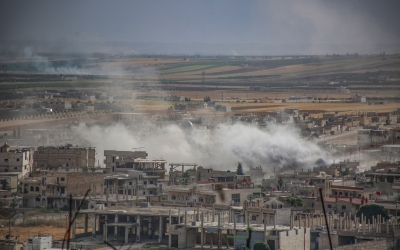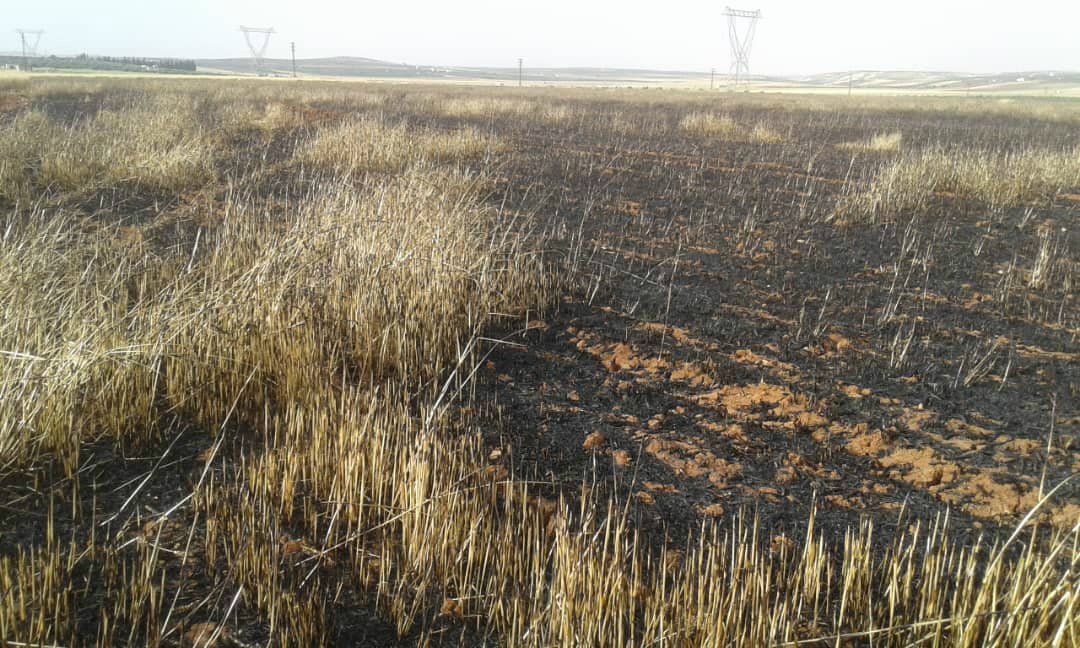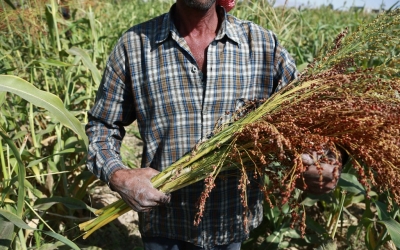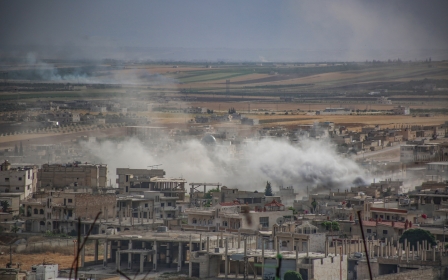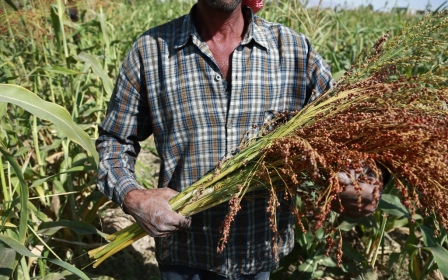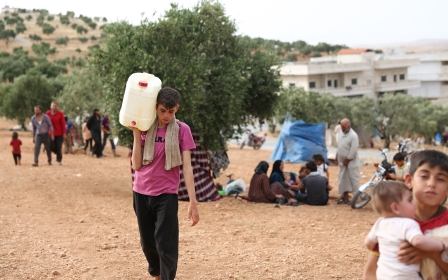'Weaponisation of hunger': Idlib's farmers victims of scorched-earth campaign
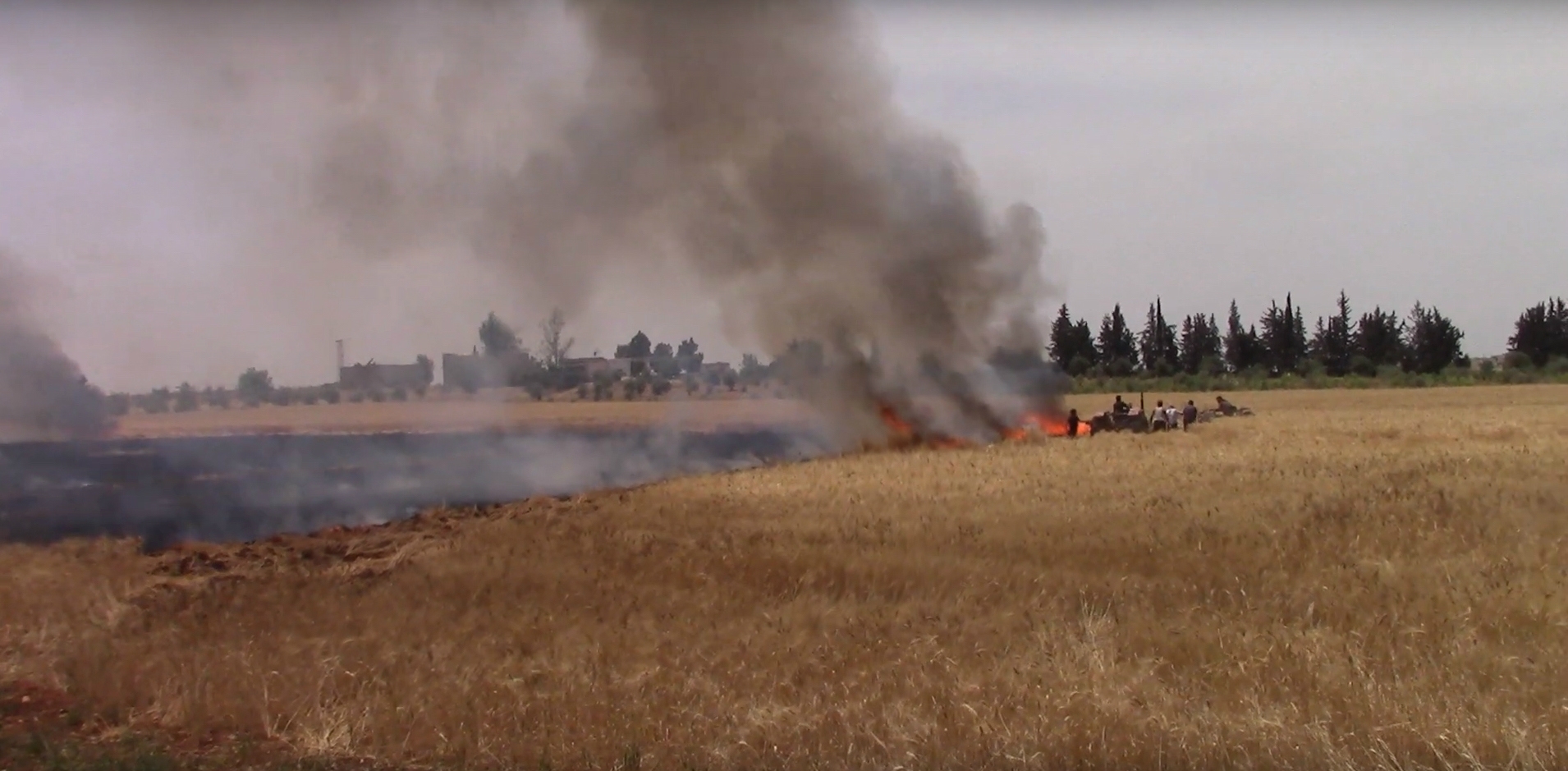
The night sky was bright and the air thick with smoke as Wasel Najim, a farmer in rural Khan Sheikhoun, in southern Idlib, watched his livelihood dissolve into ash.
Where amber fields of wheat and barley had grown, a violent sea of orange quickly spread.
"It was like out of a movie, seeing your field burn in front of your eyes," Najim told Middle East Eye. "The night became daylight because the fire was everywhere."
Khan Sheikhoun is mostly rural, home to farmers like Najim and his five brothers, whose land has been in the family for generations.
Najim said Syrian warplanes targeted their fields with white phosphorus-loaded munitions, the use of which in civilian areas is banned under international conventions.
Frantically, Najim drove his tractor right up to the edge of the fire and started clearing the area of vegetation.
He hoped that might starve the fire of the fuel it needed to spread, but it wasn't enough to keep the flames from devouring his crops.
"I lost about four acres of wheat and 10 acres of barley that night," Najm said. "But I didn't lose anyone in my family. My loss is nothing compared to others."
'Burn all aspects of life'
Attacks on farms like Najim's are being made as the Syrian government attempts to recapture Idlib province, the last remaining opposition stronghold, in what could be the final showdown of the country's eight-year war.
Although Idlib province witnessed an uneasy lull in violence in late 2018 following a Turkish and Russian agreement brokered in Sochi, the Syrian government and its ally Russia have continued to violate the deal.
In a major escalation just over a month ago, Syria and its ally Russia have launched multiple air attacks to try to take control of Idlib, which is now under the control of Hayat Tahrir al-Sham, al-Qaeda's former Syrian branch.
You can't imagine how desperate I am. There is no solution on the horizon
- Farmer Abu Nidal
Since late April, more than 160 civilians have been killed and more than a quarter of a million people have fled north to the Turkish border, the United Nations says.
Both Damascus and Moscow have repeatedly denied targeting civilian areas, and instead claim they are clearing militants from the area.
But activists on the ground said Syrian and Russian warplanes have pummelled farmland across northwest Syria in what the volunteer first responders known as the White Helmets have called an attempt to "burn all aspects of life".
"The bombing in my town is around the clock," said Mahmoud Hamwi, a media activist from Lataminah in northern Hama.
"It's really heartbreaking to see farmers trying to extinguish the fires," he told MEE.
At first, Hamwi thought the fields ablaze in his neighbourhood had merely been caught in the crossfire. But as more were torched, Hamwi began to suspect the farms themselves were the targets.
"The regime's thinking is, we'll target them because they are protecting terrorists," Hamwi said.
Civilians eating grass
The destruction of farmland is just the latest attempt by the government of Syria President Bashar al-Assad to starve its people into submission, say analysts.
"The tactic has been used during major military campaigns throughout the conflict, from Darayya onwards, as a way of trying to break the will of besieged populations," independent journalist Emma Beals told MEE, referring to a suburb of Damascus, large parts of which were once held by opposition fighters.
The regime blocked access to food and basic necessities in rebel-held territory throughout the war.
Grim accounts emerged of civilians eating grass and leaves in order to survive in Homs, Eastern Ghouta and other areas that were under siege.
To a lesser extent, militant groups, including the Islamic State (IS), have also sought to control the local population's access to food.
Last month, IS took credit for a series of crop fires in the countryside of Raqqa, the group's former capital in northeast Syria, which is now run by the Kurdish-dominated Syrian Democratic Forces (SDF).
Writing in its weekly online newspaper, IS said it was punishing those "who supported the enemies of Allah, the SDF".
Beals, whose work has examined food security in Syria, said the Syrian government has weaponised hunger more than any other group, and in the case of Idlib has combined crop fires with the bombardment of critical infrastructure such as hospitals and schools to inflict maximum pain.
"This combination of factors forces populations to flee, and limits the already meagre resources available to them, which increases the likelihood of them turning on the armed opposition groups controlling their areas, and pushes them towards surrender," Beals said.
Dwindling savings
Situated in the heart of the so-called Fertile Crescent, Syria was once self-sufficient in wheat.
However, years of fighting combined with a severe drought have crippled production. In 2018, the UN said Syria's wheat production fell to a near 30-year low.
But in Idlib, farmers were optimistic this year would bring a good harvest.
Just a few weeks ago, Abu Nidal was readying to gather the wheat and barley he had planted at his farm in the town of Hobait. Then came the air strikes.
After fleeing with his family to relative safety near the Turkish border, Abu Nidal received a phone call from his cousin Mustafa, who had stayed behind to keep watch over their land.
"Afraid that I would have a heart attack, he was trying to hide from me that our crops had burnt. But he eventually told me, and I said, 'It's fine. Just stay safe.'"
Just over a week later, Mustafa was killed in air strikes near their property.
Abu Nidal is now searching for work in the border city of Sarmada, where his family has found shelter in an abandoned building.
He has asked his neighbours to look after his onion and garlic crops, which have so far been spared from the fires.
As his savings dwindle, Abu Nidal is weighing what is more dangerous: running out of money to feed his family or returning to his war-ravaged town to harvest his crops.
"You can't imagine how desperate I am. There is no solution on the horizon."
Middle East Eye delivers independent and unrivalled coverage and analysis of the Middle East, North Africa and beyond. To learn more about republishing this content and the associated fees, please fill out this form. More about MEE can be found here.


